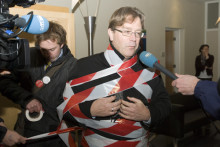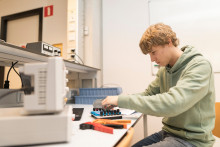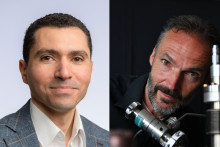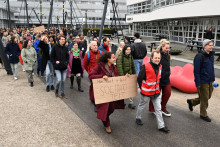One of the characteristics of Twente is that there is never that much readiness to take action. Therefore it’s extremely unlikely that we’ll see students occupying ‘de Vleugel’, the shack that houses our Executive Board (EB), any time soon. In the UT jargon, ‘activism’ is restricted to organizing and participating in extra-curricular activities such as the Study Associations. Our student representative bodies such as the Student Union and the University Council have a style of ‘thinking constructively’ and focusing on rubbing off the worst rough edges of the Executive’s policies. They never demand hard guarantees, and are happy to try to patch up problems that emerge when policies are implemented.
‘Bring in the Rector Magnificus from the Vleugel’
The last time we protested was in December 2010 against proposed legislation literally called ‘long study fines’ (‘langstudeerboete’).Anyone who took more than one year longer than the regular study duration would have to pay a penal fee. The protest itself was a jolly affair: our Rector Magnificus Ed Brinksma was brought in to the Bastille from de Vleugel, decorated with red-white ribbon: he told us he was on our side and had a beer. He promised us that the Executive Board would be supporting our cause in The Hague against the government.
But in practice the Board’s President, Anne Flierman, also a Senator for the then-governing Christian Democrat CDA party voted in favor of the bill. In favor! In the face of this provocation, we did nothing: we just kept calm and carried on. What led Flierman to leave the university, in May 2013, was to become Chair of the high-profile national education accreditation organization.
Educational Sciences
So let us please not think that the UT’s governance is not infected by this obsession with financial viability or that it is a utopian democracy. Clearly, it was this for-profit thinking that lead to the abolition of the Educational Sciences bachelor programme in 2011. That programme was rated as excellent, and was delivering good professionals, underpinned by excellent research in the associated groups. Likewise, Twente’s unique engineering approach in Educational Sciences was much-praised. But according to the Executive Board, there were too few students: not too few to fill PhD positions or for burgeoning labour market demand, though. No, just too few to create a financial surplus for the UT.
In that same academic year the whole discussion started that eventually led to the Twente Education Model (‘Twentse Onderwijsmodel’or TOM). Those discussions were launched inauspiciously with an alarming message at the end of 2010 from the Executive Board, deans and Supervisory Board: budgets needed to be cut. This process ‑ dubbed the RoUTe 14+ strategy – was dominated by financial viability arguments and created an apparent urgency for reforming bachelor education. The EB would later try to spin events to claim the TOM was driven by educational innovation, but the documents and minutes of the University Council from those days are there for you to read for yourself. Why else where programmes such as Technical Mathematics long fearful of what were at the time called ‘broad bachelors’? They need a student intake of 50 to 60 students annually to be financially viable.
It remains to be seen whether the TOM and the rest of RoUTe 14+ will ever meet their targets. A recurrent pattern with the EB is to promise extensive evaluations that tend never to materialize. Whilst there is an impressive sounding array of formal representative bodies – the University Council, the Student Union and the Personnel Platform, there is precious little they can do about this. This illustrates the lack of democracy at the UT: beyond the issue in today’s headlines of whether EB members should directly be elected, our representative bodies have few powers to hold the EB to account. And that’s really where what is sometimes vaunted as a Twente virtue – that constructive thinking and patching-up policies – really emerge.
A paper tiger
I know this all too well, for I was a member of the University Council. I too wanted the UT to move forward and improve. I too joined in in thinking constructively and was always wary in casting a ‘No’ vote. I dissented a few times, but that was always small beer. In practice the University Council always accepted EB policy, often extracting minor concessions that were in practice unenforceable.
The reality is that Dutch University Councils have no other choice: the ultimate remedy available is to initiate a conflict procedure with the EB, and that procedure is adjudicated by a national arbitration board that only has the powers to check whether the EB presented their policy through the proper channels. If they do that, then the EB get away with it. The result: student and employee participation in the Netherlands is a paper tiger.
Financial-yield in full effect
Back to Twente where financial viability concerns have the whip-hand. Policy for education, research and student facilities is all about one thing: surplus. From lab space to coffee during examinations, money is the one decisive justification to rule them all. But money should never be the primary justification for anything, and everybody knows that. Not least those whose top-rated research proposals are unfunded because the budgets don’t allow it. There have to be financial constraints, of course, but they should be a consideration for policy, and never, ever the aim.
What do we stand for as the University of Twente? What kind of knowledge and technology do we want to develop? How should a student develop as a person during their time at the UT? How should the UT make (unique) contributions to society? Those are the most important kind of questions we should be answering for ourselves, and the EB should give us the policies to deliver them: the consequences for our budget surplus should rate at most a couple of paragraphs.
Intellectual conscience of the UT
During the years I have attended many speeches by and debated with Ed Brinksma. He is the Rector Magnificus of our university, the primus inter pares of our professoriate. His role is to be the intellectual conscience of the university, our spiritual leader if you will. But despite his strong character and well-meaning intentions I firmly belief that he is failing in one of his most important duties to us, the university community. During his speeches at academic ceremonies he displays his eloquence and his scholarship, but always at a very general level. Seemingly catchy terms such as High Tech, Human Touch and Global Citizens roll off his tongue, he has beautiful pronunciation in foreign languages and one can find little to disagree with in his words. But that’s because his speeches are so general that they have a universal applicability, and remain the kind of fine words that may be delivered by anybody, anywhere at any time. Brinksma needs to become more concrete in his ideal picture of the academic world.
During debates I have often tried to persuade him to be more substantive, but I never managed. He either sticks to broad and general elaborations or lapses into a certain gloominess and utters words such as political reality and financial limitations. He did not like it when I used the term lip service, but he still did not come clean.
‘Write a Rektoratsrede’
In Germany, they have the tradition that their Rectors set out their fundamental vision for the university at the start of their term, the ‘Rektoratsrede’, and for years I have longed for our Rector to similarly make his position clear. So in the manner of the academic fencers of old, I want to throw down the gauntlet to Ed Brinksma:
Dear Professor Brinksma, do write and give your own Rektoratsrede. Be the intellectual foreman of our university. Articulate your ideal picture of the University of Twente in a concrete manner. Take a clear position and formulate and argue for your ideas so that students and employees can agree or disagree. Do not talk about money and other practicalities yet, that can come later.
Tell us about the role of the UT in the region of Twente, in the Netherlands, Europe and the world. About how an eighteen year old who matriculates at the UT is being prepared for society. What is it that separates UT alumni and research from others and why is that good? What as a future emeritus would you wish to be your legacy? Share with us what the role of students, faculty and other staff would be in this. In what is the UT good, and where should we prioritize being better?
More generally: What is your true opinion on this obsession with financial viability and the level of democracy at Dutch universities? What did you want to improve when you were an active student, back in the day in Groningen? What do you consider to be your duties as Rector Magnificus? What would you change if you were Minister of Educational Affairs? Share your reflections with us, write and give an inspiring Rektoratsrede.
Continue the debate
The heart of university discourse is in taking, defending and refuting positions. It happens too little in Twente. We cannot hide behind the fact that we are a technical university: precisely because of our technological progressiveness, we should be creating new societal capacities. Our Rector Magnificus is responsible for leading this debate. He must promote it by being a leading participant, but at the same time he must ensure that every member of our academic community feels free to participate. A Rektoratsrede is the perfect manner to revive this debate.
I hope that Ed Brinksma dares to accept my challenge. Of course there is nothing wrong with taking his time to write the speech, but he could give a quick reaction fast and let us know if he accepts and when he would deliver. After that it is up to us students and employees. Do we agree with his ideas? If so, then we can support him, for example in defending the UT’s corner in The Hague against education the minister and other politicians, to create a more suitable legal and financial footing for higher education. If not, we will enter the debate and as a last resort we can always occupy ‘De Vleugel’. But I sincerely hope that will not be necessary, for after all I am a student in Twente.
Beer Sijpesteijn is currently writing his thesis for the master programme PSTS. He was a member of the University Council during the academic year 2010-2011 and wrote a monthly column for the UT Nieuws from 2011 to 2013.







